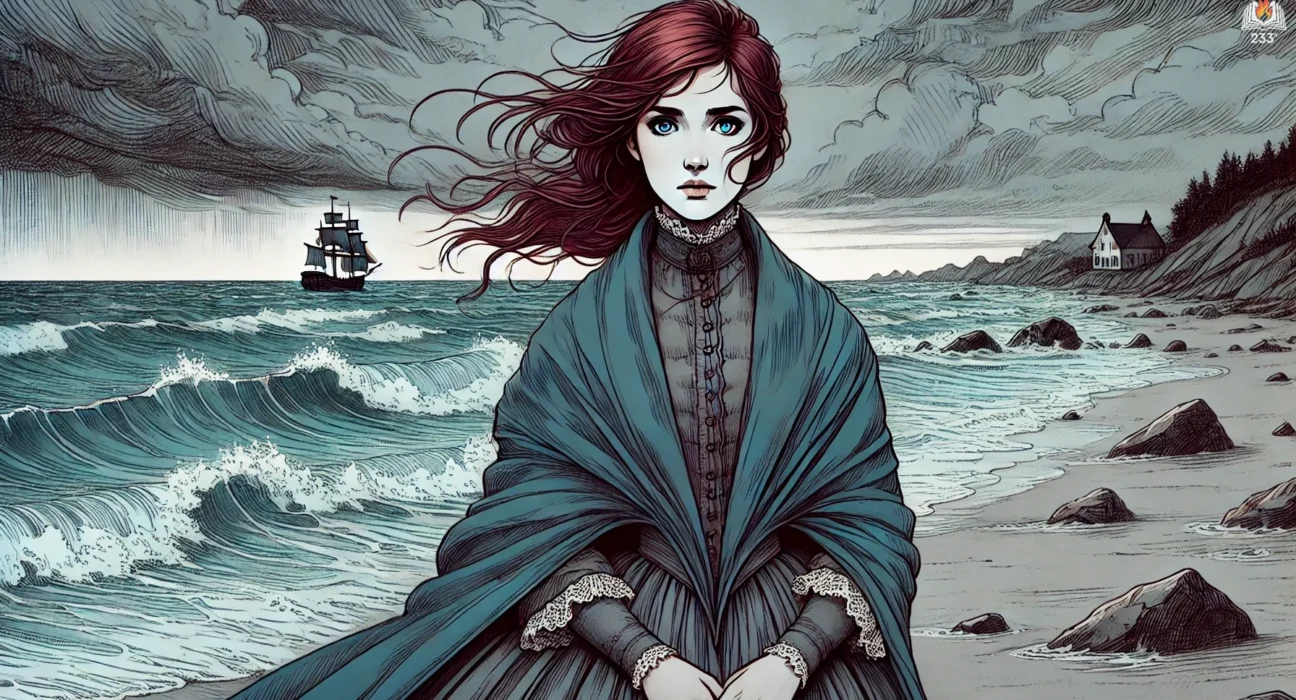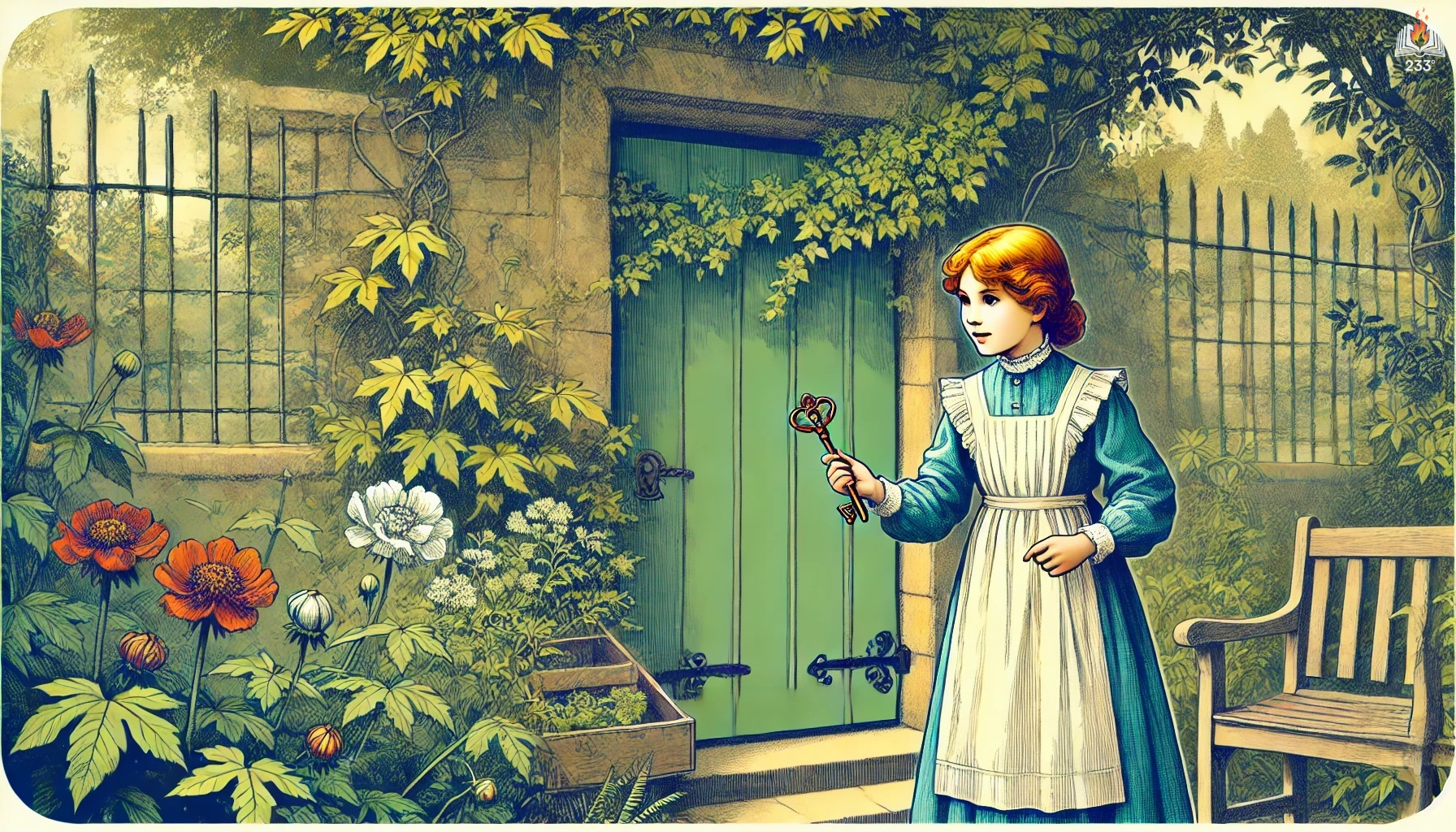Villette, written by Charlotte Brontë and published in 1853, follows Lucy Snowe, a quiet, observant, and resilient woman, as she navigates personal loss and seeks independence in the fictional European town of Villette. Brontë’s semi-autobiographical novel intertwines themes of love, identity, and faith, presenting a nuanced portrait of Victorian societal norms and a woman’s struggle for self-discovery.
Plot Summary
In the quiet town of Bretton, a girl named Lucy Snowe spends her early years surrounded by gentle domesticity, yet shadowed by an unnamed tragedy. This backdrop of calm is interrupted when she leaves her relatives and takes up residence with her godmother, Mrs. Bretton. There, Lucy meets a peculiar child named Paulina Mary, whose delicate nature and fierce devotion to her father, Mr. Home, cast a striking impression. Yet the paths of the characters soon diverge; Lucy returns to her guardians, and the child to her father.
Years pass in obscurity. Lucy, now grown, decides to leave England, driven by necessity and an unspoken yearning for purpose. Boarding a ship to the continent, she embarks on a journey marked by uncertainty and solitude. Arriving in Villette, a small French-speaking city, she finds herself adrift, a foreigner without direction. By chance, she encounters Madame Beck, the astute and authoritative headmistress of a girls’ school. Madame Beck offers Lucy employment as an English teacher, a role that grants her stability but little companionship.
Life at Madame Beck’s school is governed by discipline and watchfulness. Madame Beck’s unyielding surveillance creates an atmosphere of quiet tension, though it allows Lucy to observe the intrigues unfolding around her. Among the students is Ginevra Fanshawe, a coquettish and shallow girl who befriends Lucy. Ginevra’s beauty and frivolity are a foil to Lucy’s own reserved and thoughtful character, and though Lucy critiques her, she is drawn to Ginevra’s carefree spirit.
Lucy’s life intersects with that of Dr. John Graham Bretton, the godmother’s son she once knew in Bretton. Though neither immediately recognizes the other, a friendship rekindles. Dr. John, kind and charming, often serves as a source of solace for Lucy, though his attention is largely captivated by Ginevra. Lucy harbors unspoken feelings for Dr. John but remains steadfast in her composure, aware of the unlikelihood of reciprocation. Despite her restraint, Lucy’s internal struggles reflect a poignant longing for connection and understanding.
As the seasons change, Lucy’s inner turmoil deepens. She becomes haunted by visions of a spectral nun, a mysterious figure said to haunt the school’s grounds. The spectral appearances mirror Lucy’s psychological unease, embodying her suppressed fears and desires. The nun’s presence weaves a Gothic thread through Lucy’s otherwise pragmatic existence, its mystery lingering unresolved.
At the school, Lucy also forms an uneasy acquaintance with Monsieur Paul Emanuel, a fiery-tempered but compassionate professor. Monsieur Paul’s critical demeanor initially clashes with Lucy’s stoic resolve, yet over time, their mutual respect grows into a bond of intellectual and emotional depth. Monsieur Paul’s stern exterior hides a tenderness that becomes evident in his small acts of kindness, and his belief in Lucy’s abilities inspires her to excel. Their relationship, marked by quarrels and reconciliations, is a focal point of Lucy’s life, revealing both her vulnerabilities and her resilience.
In the midst of these dynamics, Paulina Mary re-enters Lucy’s life, now grown into a poised and gentle young woman. Paulina’s reappearance brings a sense of continuity and renewal, as she rekindles her bond with Dr. John. Unlike Lucy, Paulina’s love is reciprocated, and her eventual engagement to Dr. John offers a vision of fulfillment that stands in stark contrast to Lucy’s solitary path. While Lucy admires Paulina’s happiness, it underscores her own isolation.
As time passes, Lucy’s bond with Monsieur Paul deepens. He becomes both a confidant and a challenge, pushing her to confront her own limitations and expand her horizons. Monsieur Paul’s complex character—rooted in faith, duty, and passion—draws Lucy closer to him, even as their cultural and religious differences create barriers. His growing affection for Lucy is evident, yet his commitments to his faith and family weigh heavily on his decisions.
Monsieur Paul plans to leave Villette temporarily to oversee a plantation in the West Indies, intending to secure a future for himself and Lucy upon his return. Before his departure, he arranges for Lucy to have her own school, an act of profound trust and belief in her capabilities. Lucy, emboldened by his faith in her, throws herself into her work, finding purpose and strength in building a life of her own. The school becomes a symbol of her independence and resilience, a testament to her ability to carve out a place for herself despite the odds.
The day of Monsieur Paul’s departure arrives, marked by tender farewells and unspoken promises. Lucy waits for his return, her hope unwavering even as time stretches on. The sea, vast and uncontrollable, becomes a poignant metaphor for her longing and the uncertainty of their reunion. In her heart, Lucy remains steadfast, cherishing the memory of Monsieur Paul and the possibility of their future.
The ending remains open, a delicate balance of hope and sorrow. Lucy’s journey, filled with trials and triumphs, leaves her not defeated but enduring. She stands as a testament to quiet strength, her story echoing the complexities of human resilience and the unending search for meaning.
Main Characters
- Lucy Snowe: The introspective and pragmatic narrator. After personal tragedy, Lucy seeks employment abroad, grappling with loneliness, love, and self-definition.
- Dr. John Graham Bretton: A charming and confident young man, initially a childhood acquaintance of Lucy’s. He becomes central to her life in Villette.
- Paul Emanuel: A passionate, strong-willed professor. His fiery temperament and deep moral convictions contrast with Lucy’s reserved demeanor, creating a complex bond.
- Madame Beck: The manipulative and shrewd headmistress of the school where Lucy works. She embodies control and surveillance but also provides Lucy with opportunity.
- Paulina Mary (Polly) Home de Bassompierre: A sensitive and loyal childhood acquaintance of Lucy, whose life and relationships parallel Lucy’s own emotional journey.
Theme
- Isolation and Loneliness: Lucy’s inner world reflects her struggle with solitude and her quest for connection, showcasing the emotional toll of alienation.
- Female Independence: Lucy’s journey is a testament to the challenges women faced in asserting autonomy in a male-dominated Victorian society.
- Religion and Faith: Spirituality and differing beliefs shape Lucy’s relationships, particularly her dynamic with Paul Emanuel, who challenges her Protestant values.
- Love and Sacrifice: The novel explores unrequited love, deep affection, and the sacrifices people make for those they care about.
- Perception and Identity: The unreliable narration highlights how identity is both shaped and concealed by external perceptions and internal conflict.
Writing Style and Tone
Charlotte Brontë’s prose in Villette is rich with psychological depth and lyrical introspection. Lucy Snowe’s narration is highly subjective, weaving sharp observations of her surroundings with deeply personal reflections. Brontë often employs Gothic elements, such as mysterious happenings and shadowy figures, to amplify emotional tension. The novel’s tone alternates between melancholic and sardonic, revealing Lucy’s intellect and resilience while immersing readers in her emotional struggles.
Brontë’s vivid descriptions and use of ambiguity keep readers closely aligned with Lucy’s perspective, fostering an intimate but often enigmatic reading experience. She masterfully balances moments of quiet despair with flashes of hope and humor, creating a narrative as unpredictable and layered as its protagonist.
We hope this summary has sparked your interest and would appreciate you following Celsius 233 on social media:
There’s a treasure trove of other fascinating book summaries waiting for you. Check out our collection of stories that inspire, thrill, and provoke thought, just like this one by checking out the Book Shelf or the Library
Remember, while our summaries capture the essence, they can never replace the full experience of reading the book. If this summary intrigued you, consider diving into the complete story – buy the book and immerse yourself in the author’s original work.
If you want to request a book summary, click here.
When Saurabh is not working/watching football/reading books/traveling, you can reach him via Twitter/X, LinkedIn, or Threads
Restart reading!








